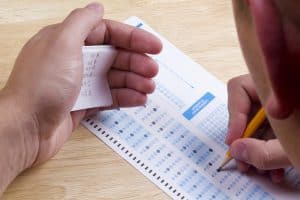It is obvious to people what cheating is in school or any educational institution. However, not everyone has the same view of it; hence, it is usually a very subjective topic. Also, cheating is differently defined by schools and, in most cases, is based on their academy.
If you are wondering if it is wrong – or even considered cheating – to ask help for your assignments, it is not. The point of assignments is for you to have something to get back and apply what you learn at school. As long as you learn something from it – be there help or not – you are in a good position.
To understand cheating in a technical approach, it is best to learn what is usually considered part of it.
Cheating
Cheating always takes various forms, such as using crib notes, looking over someone’s work during exams, and sharing any forbidden information. As the years go by, there have been a plethora of methods that students use in order to cheat their way through exams and tests. For instance, some students tend to hide notes in the bathroom on the day of their exam. They will ask permission from their professor to take a look, though their agenda is to cheat using the hidden notes.

Going back to the topic of whether it is considered cheating if you ask help for your assignments, the answer is the same: No. In a sense, there is no academic dishonesty involved. For instance, you require help for your Biology homework and you chanced upon a site that offers homework help in Biology. This narrative here does not speak of cheating. You are merely looking for a way to answer your assignment. Again, the point of having an assignment is to have something to review – or learn – at home.
It is worth noting, however, that cheating does not usually blend in with other academic dishonesty. Take plagiarism for example. This one is a completely different narrative, though it conveys the same negative thought.
Plagiarism
As the name suggests, it is about using someone else’s work or ideas and present it as your own. It also means using a previously marked project or work in an unauthorized manner for a certain task. The epitome of plagiarism, most especially in this digital age, is borrowing texts from a certain source without asking permission or referring to it.
Fabrication
This one here is all about falsification of information, data, or any other citations. For instance, you are presenting a study in your class. As you try to back-up your theory or study, you site an unknown source. In reality, this so-called source does not exist. You are simply making up arguments or inventing quotations.
As for data falsification, this could be about editing a set of data for a research without proper claims. You just falsified the data gathered in order to look presentable and acceptable. Biographical references are also among the most fabricated data. This is especially true when students need a certain number of references or citations in order to generate a particular study or paper.
Deception
Believe it or not, deception has become a common thing in many schools nowadays. Some students would really go to the length of deceiving their professors or teachers in order to amend their grades or performances. For example, students are asked to submit a written paper. Apparently, they are having a hard time passing it on time. They instead decided to make a false claim or excuse just to get the sympathy of the teacher.
Any of these methods above are by no doubt NOT the way you’d like to answer your assignments in college or even in life. Be responsible, use credible information and be honest. These tips go to everything you will choose to do in life. Not only in college.
